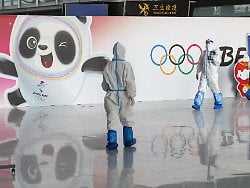Fear of crisis after the games
German economy fears superspreader Olympics
01/29/2022, 1:08 p.m
Thousands of foreigners travel to China for the Winter Olympics. If they bring in the omicron virus, Beijing could lock down the economy again. The BDI warns that this would not only have serious consequences for the producers and exporters there, but also for the companies in this country. How big is the risk?
The German economy normally looks forward to the Olympic Games. Major sporting events regularly boost sales of TV sets, causing many a couch potato to buy new sports equipment or clothing. And they ensure more readers and viewers in the media with increasing advertising and sales revenues.
However, the winter games in Beijing starting next week are causing major concerns in the executive floors of companies. And that has a reason: Omicron. There is fear that the games will become a superspreader event that will carry the highly contagious variant of the corona virus to the People’s Republic. As is well known, the government there is pursuing a zero-Covid strategy: even the smallest outbreaks send megacities into a hard lockdown for weeks, entire factories and port facilities are closed. Experts warn that if an omicron wave follows the Olympics, it would also hit Germany hard.
“Should the Omicron variant also spread more quickly and easily in China, this could again become a bottleneck for global supply chains and fuel a recession in certain sectors of German industry,” warns the Federation of German Industries (BDI). In view of the Olympic Games, for which thousands of foreigners could enter and bring in the omicron virus, the BDI expects new lockdowns. These could pose new challenges for producers and exporters as well as companies at the end of the supply chain. “The bottlenecks would probably also be accompanied by higher prices, which would have a further impact on inflation,” said the BDI.
China the “greatest concern” for Drosten
The 1.4 billion inhabitants are mostly vaccinated, but only with domestic vaccines. And they are apparently even less effective against the highly contagious omicron than the mRNA vaccines used in Germany, for example. The Charité virologist Christian Drosten recently described China as his “biggest concern” at the moment.
“An escalating omicron outbreak in China and the Chinese government’s attempts to contain it are likely to have negative consequences for Europe,” says Klaus-Jürgen Gern, an expert on international economic activity at the Kiel Institute for the World Economy (IfW). “This is also supported by the fact that the amount of global goods stuck on container ships has recently increased again.” According to the IfW, there are currently 15 percent fewer goods on the Red Sea – the most important shipping trade route between Europe and Asia – than would be expected under normal circumstances. “The gap was last this big in mid-2020, when the corona pandemic forced numerous economies into lockdown for the first time,” says Gern.
Germany is dependent on a smooth exchange: the Federal Republic of Germany purchases as many goods from China as from no other country in the world. From January to November 2021 alone, there were goods worth 127 billion euros. At the same time, the Middle Kingdom is the second most important sales market for goods “Made in Germany” after the USA. In the first eleven months of last year, export sales of more than 95 billion euros were made there. With China also playing a key role in the global economy, the International Monetary Fund (IMF) has already called on Beijing leaders to reverse their strict zero-Covid strategy. The restrictions proved to be a burden – for both the Chinese and the global economy, says IMF chief Kristalina Georgieva.
Mercator: “Don’t share pessimism”
The Mercator Institute for China Studies (MERICS) does not assess the prospects for the games, which will be held from February 4th to 20th, as gloomy. “Yes, the Olympics lead to further uncertainty – no question about it,” says chief economist Max Zenglein. “But I don’t share the complete pessimism.” China may shut down a bicycle factory, but will not shut down companies that make critical components for a long time. In the past year ports have been closed from time to time. However, there were no dramatic consequences for the global economy. “We are in a different situation than when the pandemic broke out two years ago,” emphasizes China expert Zenglein. “Back then it came suddenly. Now companies can prepare. At least those who can plan ahead in their supply chains should have stocked up and stocked up.”
The People’s Republic coped well with the Corona crisis and was the only major economic power to actually grow in 2020. Last year, the world’s second largest economy, after the USA, even went a step further: At 8.1 percent, the gross domestic product increased more than it had in a decade. This year, however, growth is likely to be significantly lower at a good five percent – also because of the real estate crisis, triggered by the payment difficulties of the real estate group Evergrande.
“It can be assumed that there will be new outbreaks with the Olympics,” expects Merics expert Zenglein. It will then depend on whether these can be limited regionally. “If we manage to limit the restrictions regionally to Beijing, then I think the economic consequences will be limited.”
